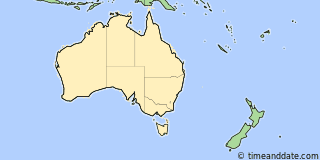Oct 6, 2024, 2:00 am
In some areas of Australia
| Country: | Australia |
|---|---|
| Long Name: | Commonwealth of Australia |
| Abbreviations: | AU, AUS |
| Capital: | Canberra |
| Time Zones: | 5 (Main Country) |
| Total Time Zones: | 8 (with dependencies) |
| Dial Code: | +61 |
Note: Only some parts of Australia use DST in 2028.
Apr 2
Back 1 hour
Apr 2, 2028 - Daylight Saving Time Ends
When local daylight time is about to reach
Sunday, April 2, 2028, 3:00:00 am clocks are turned backward 1 hour to
Sunday, April 2, 2028, 2:00:00 am local standard time instead.
Sunrise and sunset will be about 1 hour earlier on Apr 2, 2028 than the day before. There will be more light in the morning.
Also called Fall Back and Winter Time.
Oct 1
Forward 1 hour
Oct 1, 2028 - Daylight Saving Time Starts
When local standard time is about to reach
Sunday, October 1, 2028, 2:00:00 am clocks are turned forward 1 hour to
Sunday, October 1, 2028, 3:00:00 am local daylight time instead.
Sunrise and sunset will be about 1 hour later on Oct 1, 2028 than the day before. There will be more light in the evening.
Also called Spring Forward, Summer Time, and Daylight Savings Time.
When Does DST Start and End in Australia?
Daylight Saving Time (DST) is used in the Australian Capital Territory, New South Wales, South Australia, Tasmania, and Victoria (see map). Here, it starts the 1st Sunday of October and ends the 1st Sunday of April.
Which States and Territories Don't Use DST?
Western Australia, Queensland, and the Northern Territory don't use DST, as shown in the map below.
Which States and Territories use Daylight Saving Time in 2028

Areas in Australia on standard time all of 2028
DST in States and Territories in Australia in 2028 (8 in total, 5 where all observe DST, 3 which don't observe DST) | |||||
|---|---|---|---|---|---|
| Australian Capital Territory | Oct 1 – Apr 2 | Queensland | No DST | Victoria | Oct 1 – Apr 2 |
| New South Wales | Oct 1 – Apr 2 | South Australia | Oct 1 – Apr 2 | Western Australia | No DST |
| Northern Territory | No DST | Tasmania | Oct 1 – Apr 2 | ||
DST in Other Locations in Australia in 2028 (1 Location) | |
|---|---|
| Lord Howe Island | Oct 1 – Apr 2 * |
| * DST is 30 minutes ahead of standard time. | |
Lord Howe Island's DST
Lord Howe Island is located about 600 kilometers (373 miles) northeast of Sydney. The island's DST schedule is in sync with the rest of Australia. However, the clocks go forward only 30 minutes, from UTC+10.30 to UTC+11.
Daylight Saving Time in Dependencies of Australia
| Dependency | Type | Daylight Saving Time Period |
|---|---|---|
| Christmas Island | Territory | No Daylight Saving Time |
| Cocos Islands | Territory | No Daylight Saving Time |
| Norfolk Island | Territory | Oct 1 – Apr 2 (Different dates than Australia) |
Australian dependencies do not use DST.
Daylight Saving Time History in Australia
- Australia first observed Daylight Saving Time in 1916.
- Australia has observed DST for 63 years between 1916 and 2024 (DST in at least one location).
- Previous time with no Daylight Saving Time was 1966.
- See Worldwide DST Statistics
On October 2, 1916, during World War I, Tasmania became the 1st state in Australia to use DST. The measure was applied in all Australian states and territories in 1917. It was removed in the whole country in 1918. Seasonal change was reintroduced during World War II, when it was used from 1942 to 1944.
After the end of the war, DST was not observed in any Australian state or territory until October 1, 1967, when Tasmania reintroduced it during a drought. The state has continued changing its clocks ever since.
In 1971, the Australian Capital Territory, New South Wales, South Australia, Victoria, and Queensland followed Tasmania.
Queensland abandoned DST already in 1972 and, with the exception of a trial from 1989 to 1992, it has not been in use. Western Australia conducted a DST trial from 2006 to 2009, but it was abandoned for its unpopularity. The Northern Territory has not used DST since 1944.
